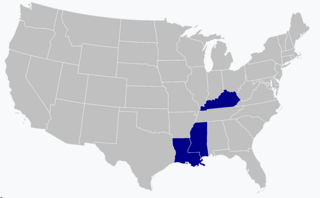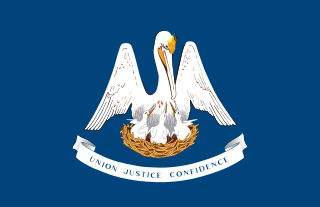
United States gubernatorial elections were held in October and November 2007 in three states. The final results were a net change of zero among the parties, with one Republican pickup and one Democratic pickup balancing each other out.
Paul Jude Hardy is an American attorney from Baton Rouge, in the U.S. state of Louisiana, who was the first Republican to have been elected lieutenant governor of the U.S. state of Louisiana since Reconstruction. He served in the second-ranking post under Governor Buddy Roemer from 1988 to 1992.

The Louisiana gubernatorial election of 1944 was held in two rounds on January 18 and February 29, 1944. Like most Southern states between the Reconstruction Era and the Civil Rights Movement, Louisiana's Republican Party was virtually nonexistent in terms of electoral support. This meant that the two Democratic Party primaries held on these dates were the real contest over who would be governor. The 1944 election saw the reformer ‘anti-Long’ faction retain power for another four years under Jimmie Davis.

The Louisiana gubernatorial election of 1952 was held in two rounds on January 15 and February 19, 1952. Like most Southern states between the Reconstruction Era and the Civil Rights Movement, Louisiana's Republican Party was virtually nonexistent in terms of electoral support.

The Louisiana gubernatorial election of 1959–60 was held in two rounds on December 5, 1959, and January 9, 1960. After an election which featured some of the most racially charged campaign rhetoric in Louisiana political history, Jimmie Davis was elected to his second nonconsecutive term as governor after defeating the Republican candidate, Francis Grevemberg, in the general election.

The Louisiana gubernatorial election of 1971–1972 was held in three rounds. The two Democratic Party primaries were held on November 6 and December 18, 1971. The general election was held on February 1, 1972, in which Edwin Edwards defeated Republican candidate David Treen to become Governor of Louisiana.

The Louisiana gubernatorial election of 1924 was held in two rounds on January 15 and February 19, 1924. Like most Southern states between the Reconstruction Era and the Civil Rights Movement, Louisiana's Republican Party was virtually nonexistent in terms of electoral support. This meant that the two Democratic Party primaries held on these dates were the real contest over who would be governor. The 1924 election saw Henry L. Fuqua defeat Hewitt Bouanchaud to become Governor of Louisiana, and saw the beginning of the political rise of Huey P. Long, who came in a surprisingly strong third.

The Louisiana gubernatorial election of 1995 was held on November 18, 1995 to elect the Governor of Louisiana.

The Louisiana gubernatorial election of 1940 was held in two rounds on January 16 and February 20, 1940. Like most Southern states between the Reconstruction Era and the Civil Rights Movement, Louisiana's Republican Party was virtually nonexistent in terms of electoral support. This meant that the two Democratic Party primaries held on these dates were the real contest over who would be governor. The election resulted in the defeat of Earl K. Long and the election of Sam H. Jones as governor of Louisiana on a reform platform.

The Louisiana gubernatorial election of 1936 was held on January 21, 1936. Like most Southern states between the Reconstruction Era and the Civil Rights Movement, Louisiana's Republican Party was virtually nonexistent in terms of electoral support. This meant that the Democratic Party primary held on this date was the real contest over who would be governor. The election resulted in the victory of Richard W. Leche of New Orleans as governor. Leche was supported by the Longite faction of the party and Cleveland Dear of Alexandria by the anti-Longs' "Home Rule" ticket. State Representative Mason Spencer of Tallulah dropped out of the race and endorsed Dear, but the ballots had already been printed, and he received nearly two thousand votes.

The Louisiana gubernatorial election of 1932 was held on January 19, 1932. Like most Southern states between the Reconstruction Era and the Civil Rights Movement, Louisiana's Republican Party had virtually no electoral support. This meant that the Democratic Party primary held on this date was the real contest over who would be governor. The election resulted in the election of Oscar K. Allen as governor of Louisiana. Louisiana was one of only two states that held the election on a date other than the first Tuesday following the first Monday of November.

The Louisiana gubernatorial election of 2007 was held on October 20. The filing deadline for candidates was September 6. On the day of the election, all 12 candidates competed in an open jungle primary. With all precincts reporting, Bobby Jindal won the election with 54%.

Since 1977 state elections in Louisiana have used a unique system similar to the majority-runoff system used in some other jurisdictions, which in Louisiana has become known as a “jungle” primary or an "open" primary, where all the candidates for an office run together in one election. If someone gets a majority, that individual wins outright; otherwise, the top two candidates, irrespective of partisan affiliation, meet in a runoff election. This primary system is used for state, parish, municipal, and Congressional races, but is not used for presidential elections.

The 2010 United States elections were held on Tuesday, November 2, 2010, in the middle of Democratic President Barack Obama's first term. During this midterm election year, all 435 seats in the United States House of Representatives and 37 of the 100 seats in the United States Senate were contested, along with 39 state and territorial governorships, 46 state legislatures, four territorial legislatures and numerous state and local offices. Approximately 82.5 million people voted.

The Louisiana gubernatorial election of 1916 was held on April 18, 1916. Like most Southern states between the Reconstruction Era and the Civil Rights Movement, Louisiana's Republican Party was virtually nonexistent in terms of electoral support. This meant that the Democratic Party primary held on January 25 was supposed to be the real contest over who would be governor. However, in this particular election Progressive Party nominee John M. Parker ran an unusually competitive campaign, garnering 37% of the general election vote. The election resulted in the election of Democrat Ruffin G. Pleasant as governor of Louisiana.

The Louisiana gubernatorial election of 1912 was held on April 16, 1912. Like most Southern states between Reconstruction and the civil rights era, Louisiana's Republican Party was virtually nonexistent in terms of electoral support. This meant that the Democratic Party primary held on January 23 was the real contest over who would be governor. The election resulted in the election of Democrat Luther E. Hall as governor of Louisiana.

The Louisiana gubernatorial election of 1908 was held on April 21, 1908. Like most Southern states between Reconstruction and the civil rights era, Louisiana's Republican Party had virtually no electoral support. This meant that the Democratic Party primary held on January 28 was the real contest over who would be governor. This election marked the first time Louisiana used primaries to nominate party nominees. The election resulted in the election of Democrat Jared Y. Sanders, Sr. as governor of Louisiana.

A general election was held in the U.S. state of Louisiana on October 24, 2015. All of Louisiana's executive officers, and both houses of the Louisiana State Legislature were up for election. Under Louisiana's jungle primary system, all candidates appeared on the same ballot, regardless of party and voters voted for any candidate, regardless of their party affiliation. Since no candidate received a majority of the vote during the primary election, a runoff election was held on November 21, 2015 between the top two candidates in the primary. Louisiana is the only state that has a jungle primary system.

United States gubernatorial elections were held in 1935, in three states. Kentucky, Louisiana and Mississippi hold their gubernatorial elections in odd numbered years, every 4 years, preceding the United States presidential election year.

United States gubernatorial elections were held in 1931, in four states. Kentucky, Louisiana and Mississippi hold their gubernatorial elections in odd numbered years, every 4 years, preceding the United States presidential election year. New Jersey at this time held gubernatorial elections every 3 years, which it would abandon in 1949.












